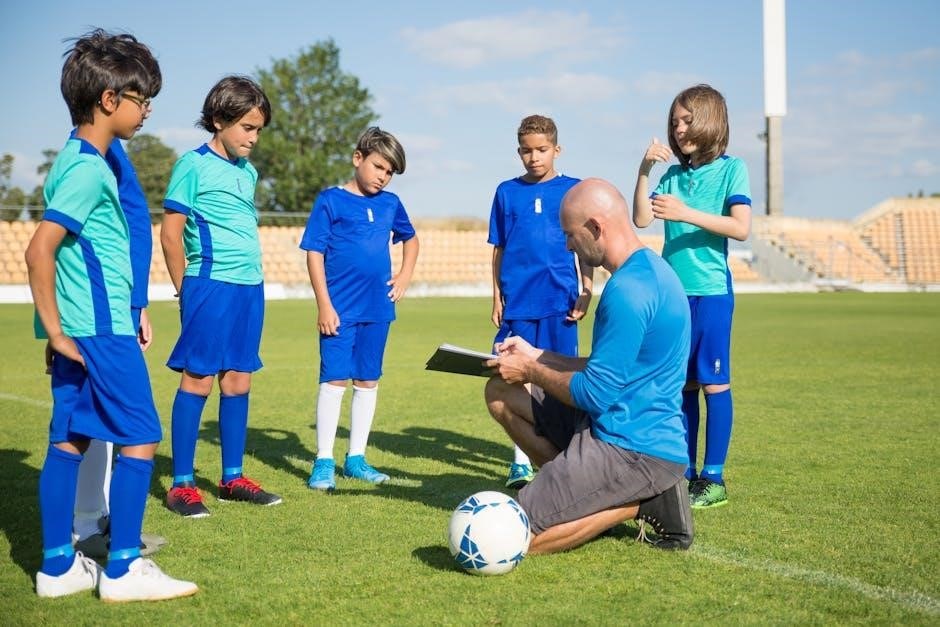Instructional coaching is a supportive role focused on enhancing teacher effectiveness and student outcomes. Coaches work with educators to refine instructional strategies, provide feedback, and foster professional growth. This role bridges classroom practice with educational leadership, aiming to create a collaborative environment for continuous improvement in teaching and learning.
What is an Instructional Coach?
An instructional coach is an educator who works collaboratively with teachers to improve instructional practices, enhance student learning, and foster professional growth. Coaches provide personalized support, helping educators analyze teaching strategies, set professional goals, and implement evidence-based practices; They act as facilitators, offering feedback, resources, and guidance to help teachers refine their skills. Instructional coaches often work with individual teachers or teams, focusing on areas like curriculum design, classroom management, and data-driven instruction. Their role is not evaluative but supportive, aiming to strengthen teaching effectiveness and create a culture of continuous improvement in schools.
The Role and Responsibilities of an Instructional Coach
An instructional coach plays a pivotal role in enhancing teaching practices and student outcomes. Their primary responsibilities include providing professional development, modeling effective instructional strategies, and offering feedback to teachers. Coaches collaborate with educators to analyze data, identify areas for improvement, and develop actionable plans. They also facilitate workshops, coach circles, and one-on-one sessions to build teacher capacity. Additionally, instructional coaches support the implementation of curriculum standards, promote innovative teaching methods, and foster a culture of collaboration among staff. Their work is focused on empowering teachers to improve student learning and achievement, making them a key asset in educational settings.
Why Schools Need Instructional Coaches
Schools need instructional coaches to support teacher growth, improve instructional practices, and enhance student learning outcomes. Coaches provide personalized professional development, helping educators refine their teaching strategies and adapt to new educational trends. They foster collaboration among staff, promote data-driven instruction, and help schools achieve academic goals. Instructional coaches also bridge the gap between theory and practice, ensuring that teachers are equipped to meet the diverse needs of students. By focusing on continuous improvement, coaches contribute to a culture of excellence, ultimately benefiting both educators and students. Their role is essential for sustaining high-quality education and addressing the evolving challenges in the educational landscape;

Common Interview Questions for Instructional Coaches
Interviews often include questions about teaching strategies, classroom challenges, and coaching philosophies, as well as scenario-based inquiries to assess problem-solving and communication skills effectively.

General Interview Questions
General interview questions for instructional coaches often focus on understanding the candidate’s background, teaching philosophy, and coaching approach. Common questions include: “What inspired you to become an instructional coach?”, “How do you approach teacher development?”, and “What strategies do you use to support diverse learners?”. These questions help assess the candidate’s alignment with the school’s mission and their ability to work collaboratively. Interviewers also ask about classroom management, lesson planning, and how they measure student progress. Candidates are encouraged to reflect on their educational philosophy, teaching experiences, and how they foster a growth mindset in both teachers and students. Preparation is key to articulating clear, concise responses.
Scenario-Based Interview Questions
Scenario-based questions assess how candidates handle real-life challenges in instructional coaching. Examples include: “How would you help a teacher struggling with classroom management?” or “Describe how you’d approach a resistant teacher.” These questions evaluate problem-solving skills, adaptability, and coaching techniques. They reveal how candidates apply their knowledge in practical situations, ensuring they can navigate common coaching challenges effectively. By providing specific examples, interviewers gauge the candidate’s readiness to support teachers and improve student outcomes. These scenarios are crucial for determining the candidate’s ability to think critically and implement strategies in diverse educational settings.
Coaching-Specific Interview Questions
Coaching-specific questions focus on the candidate’s approach to instructional coaching and their experience in fostering teacher growth. Examples include: “How would you coach a teacher to improve their lesson planning?” or “Describe your strategy for building trust with educators.” These questions delve into the candidate’s coaching philosophy, their understanding of adult learning, and their ability to differentiate coaching strategies. They also assess the candidate’s knowledge of instructional practices and their capacity to align coaching with school goals. By addressing these questions, interviewers evaluate the candidate’s readiness to support teacher development and enhance student learning outcomes effectively. These inquiries are vital for identifying a coach’s suitability for the role.

Preparing for an Instructional Coach Interview
Research the district, practice answers, and prepare thoughtful questions. Showcase coaching skills, teaching experience, and leadership abilities to demonstrate readiness for the role effectively.
Researching the School District
Researching the school district is crucial for a successful instructional coach interview. Understanding the district’s mission, vision, and values aligns your coaching philosophy with their goals. Investigate their academic programs, student demographics, and challenges to tailor your responses. Familiarize yourself with their professional development initiatives and how coaching fits into their strategy. Review recent achievements or areas of focus, such as technology integration or literacy programs. This preparation demonstrates your commitment and helps you ask informed questions. It also allows you to highlight how your skills and experiences can address specific district needs, showing you are a thoughtful and prepared candidate for the role.
Practicing Your Answers
Practicing your answers is essential for an instructional coach interview. Anticipate common questions and prepare thoughtful responses using the STAR method (Situation, Task, Action, Result). Focus on highlighting your coaching experiences, teaching background, and problem-solving skills. Use specific examples from your career, such as successful coaching cycles or professional development initiatives. Role-play with a colleague or mentor to simulate the interview environment and refine your delivery. Record your responses to identify areas for improvement, ensuring clarity and confidence. Align your answers with the district’s goals and demonstrate enthusiasm for supporting teacher growth. The more prepared you are, the more likely you’ll make a positive impression during the interview;
Preparing Questions to Ask the Interviewer
Preparing thoughtful questions for the interviewer demonstrates your interest in the role and helps you assess the district’s alignment with your goals. Consider asking about professional development opportunities, how teacher needs are identified, and the district’s vision for instructional coaching. Inquire about the specific challenges teachers face and how the district measures the impact of coaching. Also, ask about the expected balance between coaching and other responsibilities. These questions show your commitment to understanding the role and contributing effectively. Tailor your questions to the district’s priorities, ensuring they are relevant and insightful. This approach helps you stand out as a proactive candidate.
- What professional development opportunities are available for instructional coaches?
- How are teacher needs assessed to inform coaching strategies?
- How does the district measure the success of instructional coaching?

Key Qualities of an Effective Instructional Coach
An effective instructional coach possesses strong communication skills, empathy, and the ability to build trust with teachers. They must also demonstrate adaptability, active listening, and a growth mindset.
These qualities foster collaboration, encourage professional growth, and support the implementation of effective instructional strategies.
Communication Skills
Strong communication skills are vital for an instructional coach, as they facilitate collaboration and understanding between coaches and teachers. Effective coaches listen actively, ask insightful questions, and provide clear, constructive feedback.
They adapt their communication style to meet the needs of diverse teachers, ensuring clarity and empathy. Building trust through open dialogue and approachable interactions is crucial. Coaches must also communicate complex ideas simply and nonverbally, such as through body language and tone, to ensure messages are well-received. Additionally, they must maintain confidentiality and professionalism in all interactions. These skills enable coaches to foster a supportive environment, ensuring teachers feel heard and empowered to grow professionally.
Leadership Abilities
Leadership abilities are essential for instructional coaches to guide teachers and foster a collaborative school culture. Coaches must inspire and motivate educators to embrace new strategies and professional growth. They lead by example, demonstrating a growth mindset and a commitment to continuous improvement. Effective coaches empower teachers by sharing best practices and encouraging innovation in the classroom. Leadership also involves fostering a sense of community, where teachers feel supported and valued. By leading with vision and initiative, instructional coaches help schools achieve their goals and create a positive, growth-oriented environment for both educators and students. Strong leadership ensures sustainable progress and collective success.
Problem-Solving Strategies
Instructional coaches must employ effective problem-solving strategies to address classroom challenges and support teacher development. They often use data analysis to identify areas of improvement and collaborate with teachers to design actionable solutions; Coaches should be adept at active listening to understand concerns, then offer creative and evidence-based strategies. They also help teachers reflect on their practices and explore innovative approaches. By fostering a growth mindset, coaches empower educators to view challenges as opportunities for professional growth. Effective problem-solving involves flexibility, adaptability, and a focus on student-centered outcomes. These skills enable instructional coaches to drive meaningful improvements in teaching and learning environments.

The Role of an Instructional Coach in Professional Development
Instructional coaches play a pivotal role in professional development by facilitating teacher growth through workshops, one-on-one mentoring, and collaborative planning. They help educators enhance teaching strategies and student outcomes.
Working with Teachers
Instructional coaches collaborate closely with teachers to enhance instructional practices, fostering a culture of continuous improvement. They provide personalized support, helping educators refine their teaching strategies through observation, feedback, and modeling. Coaches work side by side with teachers to identify areas for growth and develop actionable plans. By building trust and fostering open communication, coaches empower teachers to experiment with new techniques and reflect on their practice. This partnership not only strengthens teacher confidence but also directly impacts student learning outcomes, ensuring that instructional strategies are effective and aligned with educational goals. Effective collaboration between coaches and teachers is essential for sustainable professional development.
Developing Professional Learning Plans
Instructional coaches play a pivotal role in designing professional learning plans tailored to teachers’ needs and school goals. These plans are created through collaborative discussions, identifying areas for growth and aligning them with district objectives. Coaches assess teacher strengths, set measurable objectives, and outline actionable steps for professional development. They ensure plans are flexible, adaptable, and grounded in evidence-based practices. By involving teachers in the design process, coaches foster ownership and engagement. Regular monitoring and feedback loops are implemented to track progress and make necessary adjustments. Effective professional learning plans empower teachers to enhance their skills, ultimately benefiting student achievement and school-wide success.
Evaluating the Impact of Coaching
Evaluating the impact of coaching involves assessing how instructional coaching influences teacher practices and student outcomes. Coaches use various methods like teacher feedback surveys, classroom observations, and student performance data to measure effectiveness. They also consider qualitative changes, such as increased teacher confidence or improved classroom environments. Regular, ongoing evaluation allows for timely adjustments and ensures coaching remains aligned with school goals. Coaches may employ specific tools or software to track progress and maintain fairness by setting clear criteria. Transparent communication of results to stakeholders fosters trust and collaboration. Reflecting on evaluation findings helps refine coaching strategies, ultimately enhancing the overall impact on education.

Challenges Faced by Instructional Coaches
- Resistance from teachers hesitant to change methods.
- Difficulty measuring coaching effectiveness objectively.
- Time constraints balancing multiple responsibilities.
Resistance from Teachers
One common challenge instructional coaches face is resistance from teachers who may be hesitant to adopt new methods or seek support. This can stem from feelings of being criticized or undervalued. Coaches must build trust and rapport, emphasizing collaboration rather than evaluation. Understanding teacher concerns and addressing them with empathy is crucial. By fostering a growth mindset and highlighting the benefits of coaching, such as improved student outcomes and professional growth, coaches can reduce resistance. Successful coaches approach these situations with patience, active listening, and a willingness to adapt their strategies to meet the unique needs of each teacher and school community.
Measuring Coaching Effectiveness
Measuring the effectiveness of instructional coaching is essential to ensure its impact on teaching practices and student learning. Coaches often use feedback surveys from teachers and students to assess their influence. Classroom observations and pre-post assessments of teaching strategies also provide valuable data. Additionally, tracking improvements in student performance and teacher confidence can demonstrate coaching success. It’s important to establish clear goals and benchmarks at the outset to evaluate progress effectively. A combination of qualitative and quantitative data helps paint a comprehensive picture of coaching effectiveness, ensuring that efforts are aligned with school objectives and fostering continuous improvement in educational outcomes.
Time Management and Prioritization
Effective time management and prioritization are critical for instructional coaches to balance multiple responsibilities. Coaches often juggle working with numerous teachers, developing resources, and participating in meetings, making it essential to organize tasks efficiently. Poor time management can lead to missed opportunities to support teachers and hinder the coaching program’s success. Strategies like creating detailed schedules, setting clear goals, and using digital tools can help coaches prioritize effectively. By focusing on high-impact activities and aligning tasks with school objectives, coaches can maximize their influence and ensure meaningful outcomes. Strong prioritization skills enable coaches to adapt to changing needs while maintaining productivity and supporting teacher growth successfully.

Opportunities for Growth as an Instructional Coach
Opportunities for growth include staying updated on educational trends, building strong relationships, and expanding coaching skills.
Building Strong Relationships
Building strong relationships is a cornerstone of effective instructional coaching. Coaches must foster trust and open communication with teachers, administrators, and staff to create a collaborative environment. By actively listening, showing empathy, and understanding individual needs, coaches can establish rapport that encourages teachers to embrace new strategies and seek support; Strong relationships also involve being approachable, transparent, and adaptable to diverse teaching styles and school cultures. Cultivating these connections not only enhances the coaching process but also promotes a positive, inclusive school climate. Ultimately, strong relationships empower coaches to have a deeper impact on teacher growth and student success.
Staying Updated on Educational Trends

Staying updated on educational trends is essential for instructional coaches to remain effective and relevant. Coaches must continuously explore new teaching methodologies, technologies, and research-based practices to provide high-quality support. Engaging in professional development opportunities, such as attending conferences, webinars, and workshops, ensures they are informed about current educational innovations. Additionally, subscribing to educational journals, blogs, and online forums helps coaches stay abreast of best practices. By staying current, coaches can offer teachers innovative strategies, address evolving student needs, and align their coaching with district and national educational goals, ultimately enhancing teacher growth and student learning outcomes.
Expanding Coaching Skills
Expanding coaching skills is crucial for instructional coaches to enhance their effectiveness. Coaches can pursue advanced certifications, such as specialized training in instructional strategies or technology integration. Engaging in mentorship programs or collaborating with experienced coaches can deepen their expertise. Additionally, attending workshops on topics like data analysis, teacher motivation, and culturally responsive teaching can broaden their skill set. Coaches should also reflect on their own practices, seeking feedback from teachers and administrators to identify areas for growth. By continuously improving their skills, coaches can better support teachers, address diverse student needs, and contribute to a more dynamic educational environment aligned with district goals.
Preparing for an instructional coach interview requires understanding the role, practicing responses, and showcasing coaching skills. Effective preparation enhances confidence and demonstrates readiness to support teachers and students.

Final Thoughts on Preparing for an Instructional Coach Interview
Preparing for an instructional coach interview is a critical step in showcasing your expertise and readiness to support educators. Research the district, practice responses to common questions, and emphasize your coaching philosophy. Be ready to share specific examples of successful strategies and demonstrate your ability to collaborate. Highlight your communication skills, problem-solving abilities, and passion for professional development. Confidence and preparedness will help you stand out as a strong candidate. Remember, the goal is to illustrate how you can empower teachers and positively impact student learning. Good luck!
Additional Resources for Instructional Coaches
To further enhance your preparation for an instructional coach interview, explore reputable resources like books, online courses, and professional organizations. Books such as The Coaching Habit by Michael Bungay Stanier and Instructional Coaching: A Partnership Approach to Improving Instruction by Jim Knight offer valuable insights. Websites like Edutopia and ASCD provide articles and webinars on coaching strategies. Consider enrolling in courses on Coursera or LinkedIn Learning that focus on educational leadership and coaching. Joining professional organizations like the International Literacy Association (ILA) or the National Education Association (NEA) can also provide access to workshops and publications. These resources will help you deepen your understanding of coaching best practices and strengthen your interview readiness.
